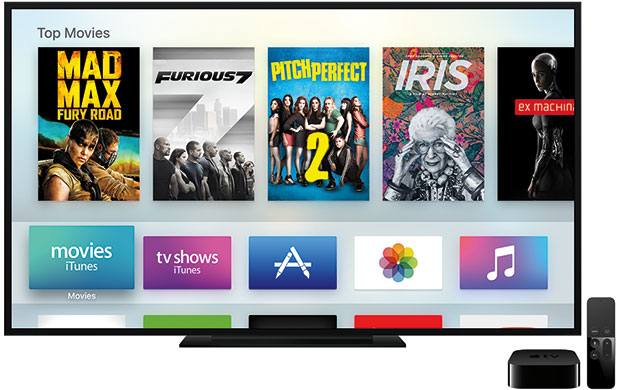Apple on Monday opened up advanced orders for the next generation of Apple TV, as promised. The set-top boxes are expected to hit homes between Oct. 30 and Nov. 3.
It’s offering two versions of the Apple TV. A 32-GB version is priced at US$149 and a 64-GB model is $50 more.
The features most likely to stand out are voice control with Siri, apps, and the range of content that Apple has and will continue to assemble.
With Apple TV losing ground to newcomers to the streaming hardware market, namely Google and Amazon, the company has revisited its set-top box and given it a booster shot: a syringe containing Siri.
Siri, Apple’s digital assistant, manifests in the form of the Apple TV’s companion remote. It’s the same helpful, politely realistic digital assistant iOS users have become familiar with over the years.
Along with Siri, the remote has been updated to include motion controls akin to Wii nunchucks. That led to speculation that Apple and Nintendo were preparing to start a gaming relationship.
While nothing with Nintendo has been announced, the other draw to Apple’s latest streaming device is content, said Andy Abramson, CEO ofComunicano.
Then there’s “same day as DVD releases, which underscores the arms race going on between Apple, Amazon and eventually Google,” he told TechNewsWorld.
“Obviously, games also are going to have a lot of appeal, as they open up the Apple TV to be something for the entire family,” Abramson said.
The market for streaming media hardware has filled out in short order over the last few years, expanding from Roku, the original Netflix player and Apple TV to Chrome and Fire and Nexus things.
Ahead of this latest refresh of the Apple TV, bringing it to its fourth generation, the company was rumored to be in talks with some of Hollywood’s top brass, with hopes of delivering original content like Amazon and Google do.
Playing Catch-Up
With Siri being one of a few serious talking points for the Apple TV, Robert McCarthy, director of security engineering atMobiquity, is unimpressed by the new set-top box.
“Color me disappointed,” he told TechNewsWorld. “Maybe it’s just me, but I see this as nothing but Apple being caught sleeping and now trying to play catch-up with the market.”
It’s going to have voice controls and a lot more games, but Amazon Fire TV has had that from the beginning, McCarthy pointed out. With accelerometers in countless smart things, the motion controls may fail to strike consumers as a stand-out feature.
“Overall, I think the new Apple TV fails to capture some of the revolutionary power that is happening with Apple Pay and iPhone 6S, and could readily be relegated to the bells and whistles bin,” he said. “All in all, this feels just like your father’s set-top box.”
Missed Opportunities
Adding to his lack of interest are the things Apple TV is lacking, McCarthy said. For one, it doesn’t support 4K resolution or high-dynamic-range imaging.
“Although it might not technically make much of a difference, from a marketing standpoint, the lack of 4K or HDR video support is confusing,” he said. “The latest iPhones are producers of 4K video. Why is the latest TV product not a consumer of it?”
There also isn’t any HomeKit integration, said McCarthy. That could tie into another area in which where Apple may have missed countless opportunities.
“A big chunk of their developer community may never work in this arena because they created yet another OS, called tvOS, that is a hybrid between OS X and iOS. I am sure there are reasons they had to do this, but it seems odd and will likely drive a further wedge into the developer community,” he said.
Though the latest flavor of Apple’s streaming hardware hasn’t thrilled McCarthy, at least in the device’s current form, it’s hard to discount the “cult of Apple.”
The Faithful: More Than a Few
Despite Apple’s roped-off ecosystem, its new products historically have called consumers over from other platforms and, on many occasions, they’ve been converted to the cult.
“That’s part of the Apple way of doing business,” Comunicano’s Abramson said. “If you look at what they did in music with the iPod, then in phones with the iPhone, how they are slowly changing the timekeeping world with the Apple Watch, with each new product they release, they redefine and become the comparative standard.”
Because viewing habits have been changing, the appeal of the Apple TV will extend beyond consumers, he said. It will have an impact on the entire television industry, further forcing the hands of the established players.
“That’s a lesson that is easily learned based on how iTunes changed the music industry,” said Abramson, “and how the iPhone has changed the mobile phone and mobile operator industry.”



















































